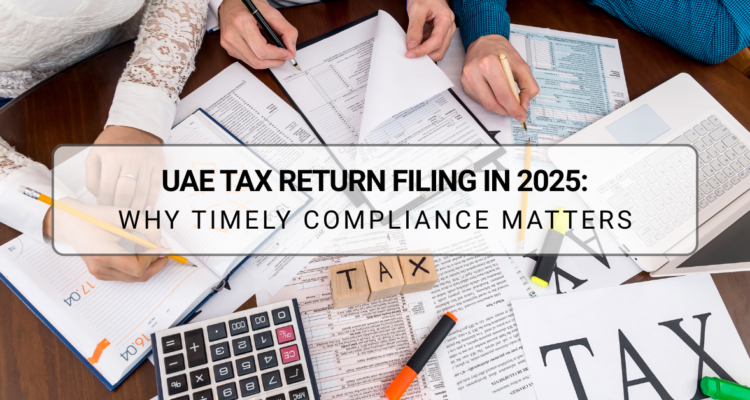In the UAE’s rapidly evolving and highly competitive business landscape, achieving sustainable growth goes far…

Corporate Tax Return Filing in the UAE: A Complete Guide
With the introduction of corporate tax in the UAE, businesses must ensure compliance with the latest regulations. Filing corporate tax returns accurately and on time is crucial for avoiding penalties and maintaining good standing with the Federal Tax Authority (FTA). This guide covers everything you need to know about corporate tax return filing in the UAE, including eligibility, filing procedures, deadlines, and best practices.
Understanding Corporate Tax in the UAE
The UAE introduced corporate tax on June 1, 2023, as part of its commitment to international tax standards. Here are the key details:
- Tax Rate: A standard rate of 9% applies to taxable income exceeding AED 375,000.
- Exemption Threshold: Businesses with income below AED 375,000 are exempt from corporate tax.
- Free Zone Businesses: Qualifying free zone businesses may enjoy a 0% tax rate if they comply with specific requirements.
- Exempted Entities: Government entities, certain investment funds, and public benefit organizations are exempt from corporate tax.
Who Needs to File a Corporate Tax Return?
All businesses operating in the UAE (except exempted entities) must file corporate tax returns, including:
- Mainland companies
- Free zone businesses (depending on eligibility for 0% tax rate)
- Foreign companies with a permanent establishment in the UAE
- Any entity conducting business activities in the UAE exceeding AED 375,000 in taxable income
Steps to File a Corporate Tax Return in the UAE
Step 1: Register for Corporate Tax
Before filing a tax return, businesses must register for corporate tax through the EmaraTax portal by the Federal Tax Authority (FTA). This requires submitting basic business details and obtaining a Tax Registration Number (TRN).
Step 2: Maintain Proper Accounting Records
Accurate bookkeeping is essential for tax filing. Businesses should maintain:
- Financial statements (profit & loss, balance sheet, cash flow statement)
- Tax invoices and receipts
- Payroll records
- Expense reports
Step 3: Calculate Taxable Income
To determine the amount of tax payable, businesses must:
- Calculate gross revenue
- Deduct allowable business expenses
- Account for any tax exemptions or reliefs
- Apply the 9% corporate tax rate on taxable income above AED 375,000
Step 4: File the Corporate Tax Return
Businesses must submit their corporate tax return via the FTA portal within the specified deadline. The return should include:
- Company financials
- Taxable income details
- Deductions and exemptions
- Tax liability calculations
Step 5: Pay the Corporate Tax Due
After filing, businesses must pay the calculated tax amount within the due date to avoid penalties.
Deadlines for Corporate Tax Return Filing
Corporate tax returns must be filed within 9 months after the end of the financial year. For example:
- If a company’s financial year ends on December 31, 2024, the tax return is due by September 30, 2025.
- If a company’s financial year ends on June 30, 2024, the tax return is due by March 31, 2025.
Late filing may result in penalties imposed by the FTA.
Penalties for Late or Incorrect Tax Filing
Businesses that fail to comply with tax filing requirements may face fines, including:
- Late Filing Penalty: AED 10,000 for the first offense, increasing for repeated offenses.
- Late Payment Penalty: Additional interest on unpaid tax amounts.
- Incorrect Tax Filing Penalty: Heavy fines if incorrect information is submitted.
- Failure to Maintain Records: AED 20,000 fine for not keeping proper records.
Best Practices for Corporate Tax Compliance
To ensure smooth corporate tax filing, businesses should:
✅ Hire a Tax Consultant: Professional tax advisors help navigate complex tax regulations and ensure compliance.
✅ Use Accounting Software: Automate financial calculations and record-keeping.
✅ Conduct Regular Tax Audits: Review financial records to detect any discrepancies.
✅ Stay Updated on Tax Laws: Monitor FTA updates to ensure adherence to new regulations.
✅ Submit Returns on Time: Avoid penalties by meeting deadlines.
Conclusion:
Corporate tax return filing in the UAE is a mandatory requirement for businesses, and compliance is crucial to avoid penalties. By understanding tax regulations, maintaining proper records, and filing returns on time, businesses can ensure smooth tax management and financial stability.
For expert assistance in corporate tax filing, schedule a free consultation with our tax specialists today!
FAQs on Corporate Tax Return Filing in the UAE
1. Who is exempt from corporate tax in the UAE?
Government entities, certain investment funds, and public benefit organizations are exempt from corporate tax.
2. Can free zone companies benefit from a 0% corporate tax rate?
Yes, qualifying free zone businesses can benefit from a 0% tax rate if they meet the eligibility criteria set by the FTA.
3. What happens if I don’t file my corporate tax return?
Failure to file tax returns can lead to penalties, legal action, and business license suspension.
4. How can I register for corporate tax in the UAE?
Businesses can register for corporate tax through the FTA’s EmaraTax portal.
5. When is the deadline for corporate tax filing?
Corporate tax returns must be filed within 9 months after the financial year-end.
6. Do small businesses need to file a corporate tax return?
If a business earns below AED 375,000, it does not owe corporate tax but still needs to file a tax return.
7. Can businesses deduct expenses from taxable income?
Yes, businesses can deduct legitimate operational expenses, such as rent, salaries, and marketing costs.




